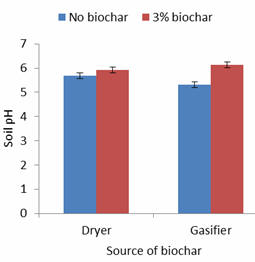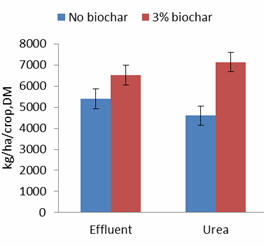 |
 |
|
Figure 1: Effect of two kinds of biochars on soil pH amendment |
Figure 2: The interaction between nitrogen sources and biochar level on rice grain yield, |
|
Reducing Greenhouse Gas Emissions from Livestock and Soils |
Huy Sokchea, Khieu Borin and T R Preston*
The field trial with rice plant as indicators were used to measure the soil fertility such as soil pH, CEC, exchangeable cation and water holding capacity by applied the biochar derived from gasification of rice husk. The experiment was designed as a 2*2*2 factorial in a completely randomized block design (CRBD) with 4 replicates. The first factor was type of biochar (gasifier and dryer machine), second factor was fertilizer (Effluent and Urea with 10g N/m2/crop) and third factor was level of biochar (0 and 3 kg/m2).
The biochar from the drier machine contained similar amount of organic matter, organic carbon and pH to the one from downdraft gasifier. The yield of rice grain was absolutely higher for the treatment with biochar, compared to the one without biochar and the interaction between biochar and urea on rice grain production was better, compared to effluent with P=0.029. However, there was no difference between the both sources of biochar on rice grain production P=0.491 in the period of 110 days. Soil pH was raised from 5.31 to 6.13 and water holding capacity by 66% when 3kg DM biochar was added to the soil per square meter.
 |
 |
|
Figure 1: Effect of two kinds of biochars on soil pH amendment |
Figure 2: The interaction between nitrogen sources and biochar level on rice grain yield, |